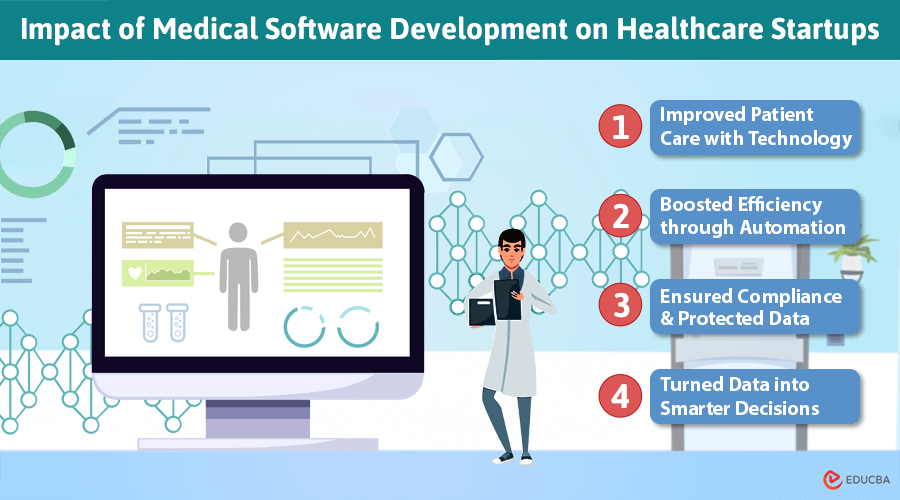
How Technology is Transforming Healthcare?
Medical software development has a significant impact on healthcare startups, reshaping how they engage with patients, optimize operations, and expand their services. By implementing advanced software solutions, startups can improve patient care, streamline processes, and ensure better compliance—key factors that drive long-term growth and success. This article explores the impact of medical software development on healthcare startups and how it empowers them to thrive in a competitive market.
Transformative Impact of Medical Software Development on Healthcare Startups
Medical software development is a game-changer for startups in a rapidly evolving healthcare landscape. Custom medical software development companies like AROBS help healthcare organizations reach their highest potential. Let us explore the impact of medical software development on healthcare startups and how it helps them thrive in a competitive market.
#1. Improved Patient Care with Technology
Medical software development enables startups to improve patient interactions, making healthcare more personalized and efficient.
- Custom Patient Portals and Mobile Apps: Patients can easily access medical records, book appointments, and receive personalized health advice through custom portals and mobile apps. For example, a physical therapy app for patients allows quick access to healthcare professionals, appointment scheduling, record viewing, and therapist communication—all from mobile devices. This boosts patient satisfaction and empowers them to manage their healthcare actively.
- Telemedicine: Telemedicine enables patients to consult doctors remotely, providing access to healthcare for those in underserved or remote areas. By offering secure video calls, efficient data sharing, and real-time communication, startups can ensure seamless healthcare delivery from the comfort of patients’ homes.
#2. Boosted Efficiency through Automation
Startups often struggle with resource management issues, and automation can be a key solution here.
- Effective Use of Practice Management Software: With comprehensive practice management software, startups can simplify administrative procedures. This software can automate various tasks, from booking appointments to handling billing and insurance claims. This not only minimizes human error and operational costs but also saves time. Healthcare professionals have more time to concentrate on patient care, thereby improving the quality of service.
- Inventory Management: For startups that deal with medical supplies, efficiently managing inventory is vital. Implementing software solutions specifically for inventory management can assist in tracking stock levels, managing restocking schedules, and preventing the shortage of essential items. Moreover, these systems can forecast usage patterns, enabling startups to optimize their procurement and avoid unnecessary expenses.
#3. Ensured Compliance and Protected Data
With strict regulations in the healthcare sector, safeguarding patient data and staying compliant with industry rules is vital for new health-related businesses.
- Easy-to-use Compliance Management Systems: Healthcare regulation can seem like a maze, but compliance management systems can simplify it. These software solutions help your startup keep up with important rules in the industry, like HIPAA and GDPR. By automating this process, startups can decrease the chance of breaking these rules, helping them avoid legal trouble and fines.
- Advanced Cybersecurity: In medical software development, a key focus can be building strong ways to guard sensitive data from threats. This includes using cutting-edge encryption, double-check systems for logging in, and real-time systems that monitor for threats and deal with them as they occur.
#4. Turned Data into Smarter Decisions
Data analytics is crucial for healthcare startups. It helps them make data-driven decisions, enhance patient care, and improve operational performance.
- Predictive Analytics for Proactive Patient Care: Predictive analytics allows startups to anticipate patient needs and trends in healthcare, enabling them to optimize staffing levels and proactively address patient care requirements. Using predictive data, startups can ensure a more personalized approach to healthcare delivery, improving patient outcomes and operational efficiency.
- Business Intelligence for Growth and Strategy: Business intelligence tools give startups insights into their operations, allowing them to analyze patient demographics, financial performance, and service usage. These insights help startups identify growth opportunities, optimize services, and make informed decisions. Strategic use of business intelligence helps ensure long-term success by guiding key business decisions based on data.
Investment and Returns
As your healthcare startup leverages analytics for growth, it’s essential to understand both the investment and the potential returns. Investing in medical software development can be a significant expense, but the benefits are worth considering. Look at how the software can improve operational efficiency, enhance patient outcomes, and streamline service delivery. These improvements can increase patient satisfaction and retention, ultimately increasing revenue.
It is important to choose a solution that can scale and evolve with your startup’s needs. Be sure to account for the total cost of ownership, including setup, ongoing maintenance, and potential upgrades. By carefully evaluating these factors, you can ensure that your investment pays off and drives profitability and long-term growth for your startup.
Final Thoughts
The impact of medical software development on healthcare startups is transformative. By improving patient experience, enhancing operational efficiency, ensuring compliance, safeguarding data, and leveraging data analytics, startups can thrive in the competitive healthcare market. Healthcare startups can improve patient outcomes with the right technology solutions and position themselves for sustainable growth and success.
Recommended Articles
We hope this guide on the impact of medical software development provides valuable insights into how technology is transforming healthcare. Check out these recommended articles for more information on the latest advancements and their potential to improve patient outcomes.

